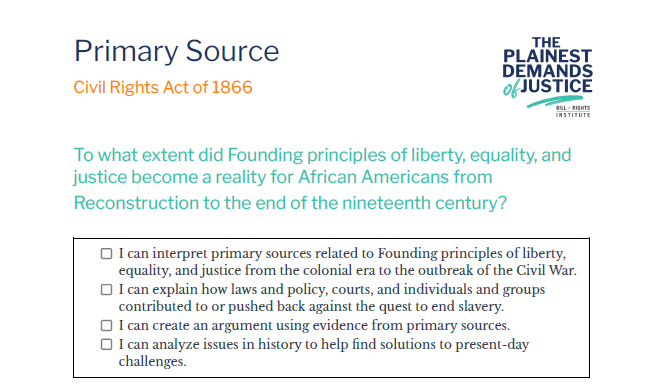Civil Rights Act of 1866
Guiding Question: To what extent did Founding principles of liberty, equality, and justice become a reality for African Americans from Reconstruction to the end of the nineteenth century?
- I can interpret primary sources related to Founding principles of liberty, equality, and justice from the colonial era to the outbreak of the Civil War.
- I can explain how laws and policy, courts, and individuals and groups contributed to or pushed back against the quest to end slavery.
- I can create an argument using evidence from primary sources.
- I can analyze issues in history to help find solutions to present-day challenges.
Essential Vocabulary
| Convey | To transfer property from one person to another |
Building Context
The Civil Rights Act of 1866 was adopted largely in response to the first round of Black Codes, such as those seen in Document 4. This bill was the first time federal law defined citizenship and guaranteed “equal benefit of all laws.” The bill was vetoed by President Andrew Johnson, but Congress secured a two-thirds majority in both the House and Senate to override his veto.
Civil Rights Act of 1866
Source Link: https://www.facinghistory.org/reconstruction-era/civil-rights-act-1866
April 9, 1866
Be it enacted by the Senate and House of Representatives of the United States of America in Congress assembled, That all persons born in the United States and not subject to any foreign power, excluding Indians not taxed, are hereby declared to be citizens of the United States; and such citizens, of every race and color, without regard to any previous condition of slavery or involuntary servitude, except as a punishment for crime whereof the party shall have been duly convicted, shall have the same right, in every State and Territory in the United States, to make and enforce contracts, to sue, be parties, and give evidence, to inherit, purchase, lease, sell, hold, and convey [transfer property] real and personal property, and to full and equal benefit of all laws and proceedings for the security of person and property, as is enjoyed by white citizens, and shall be subject to like punishment, pains, and penalties, and to none other, any law, statute, ordinance, regulation, or custom, to the contrary notwithstanding.
Comprehension and Analysis Questions
- How did this bill define citizenship? Who was excluded from this definition?
- What specific rights does this legislation guarantee to all citizens of the United States?
